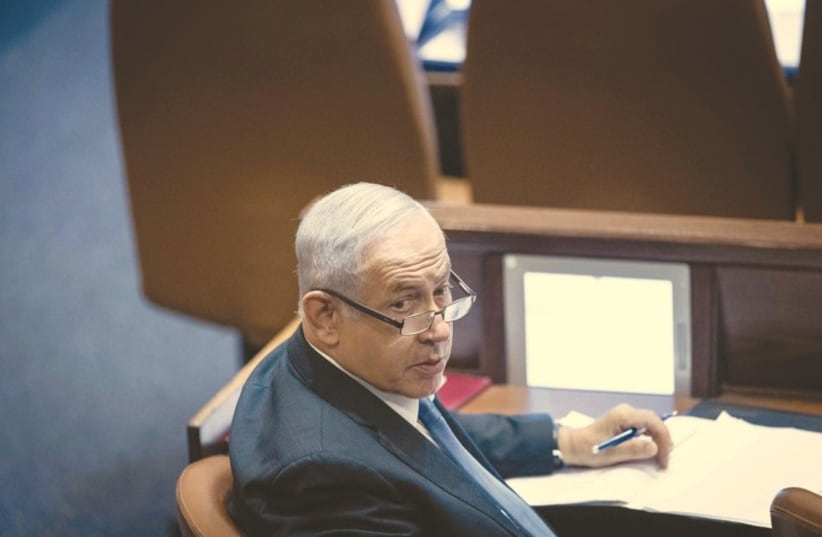Former prime minister Benjamin Netanyahu has his fair share of allies.
Likud MK Miri Regev can be called an ally, as can former justice minister Amir Ohana and Shas head Aryeh Deri. But former Supreme Court president Aharon Barak? Can Barak, that symbol of judicial activism so repugnant to the Right that Netanyahu has led for years, legitimately be called a Netanyahu ally?
Yet that is precisely how Barak was characterized in a report in The Guardian on Sunday about efforts by Barak to mediate a plea deal between Netanyahu and Attorney-General Avichai Mandelblit.
“The retired supreme court president Aharon Barak, a long-standing ally of Netanyahu, has reportedly acted as the liaison between the former prime minister and state prosecutors,” the report read.
Liaison? Yes. Long-standing ally? That seems a bit of a stretch, even if the two men have been in contact for years, and Barak ruled from the bench in 1995 in Netanyahu’s favor in a case involving the then-opposition head reading from a classified document in the Knesset that showed the government of Yitzhak Rabin agreed to withdraw from the Golan Heights.
But in light of Barak’s surprising support of a plea deal for Netanyahu, and his even more surprising appreciation of Netanyahu’s defense of the court and judicial system before he was indicted, many will take the easy route and say that Barak – long the darling of the Left – is doing this because he is a “long-standing ally of Netanyahu.”
Saying this just makes life much less complicated.
Why is Barak in favor of a plea? It can’t be because he believes it is the right thing to do. It must be because he is a “long-standing ally of Netanyahu,” even though that alliance had to be one of the country’s best-kept secrets.
Barak explained his support of a plea because Netanyahu has done much to protect the country’s legal system before his indictments, that ending the trials would help heal a nation deeply divided over Netanyahu, and that it would also restore public trust in the judiciary.
“I am in total agreement with the former president of the Supreme court,” former deputy president of the Tel Aviv District Court Oded Mudrich said in a KAN Reshet Bet interview on Monday. “For some time, and it is not important right now who was responsible, a giant group of people has been created who have lost their trust in the judicial system, against the background of this case. It’s a feeling of [the judicial system] going after one man, a position I don’t think is justified, but it exists.”
JUST HOW many people have lost their faith in the legal system came out in several surveys conducted in October by the Israel Democracy Institute. According to the survey, only 41% of the public said they trust the Supreme Court, a number that is on a steady decline.
In addition, more than half the public (52%) believes that the political affiliation of elected officials influences the way they are treated by the legal system, and 63% of those who identify as being on the Right believe that the actions of the State Attorney’s Office are based mainly or solely on political considerations.
Faith in the legal system is a foundation of a good, working democracy.
If the public loses trust in the office of the president, that would be unfortunate, but not the end of the world since the public has little direct contact with the president.
Ditto regarding the Knesset. A lack of trust in the Knesset is sad, but par for the course – publics around the world are skeptical of their nation’s parliaments.
But a lack of trust or faith in the legal system is especially corrosive, because average citizens come into contact with the legal system, and they need to believe that it is fair. If a majority of the public doesn’t believe this is the case, then there is a serious problem.
There will be those who will argue that Netanyahu, who has railed against the legal establishment since the investigation in his cases began, is responsible for this lack of faith. While there may be truth in that charge, it does not negate that this lack of trust exists, and it is damaging.
If the Netanyahu trial runs its course, and if he is convicted and even sent to jail, the chorus of those saying he was railroaded will only grow louder and louder.
Barak realized this, which is one of the reasons he advised Mandelblit to accept a plea deal.
The anti-Netanyahu forces will be furious at any deal, even one – such as the one under discussion – that sends Netanyahu into political exile for the next seven years. They want to see Netanyahu serve jail time and argue that since this deal is good for the former premier, it must be bad.
But the deal is not only good for Netanyahu. It is also good for the judicial system since it could be the start of a process to restore the faith in that system of a significant chunk of the public that – whether justifiably or not – has lost it. And that is good for the country.

